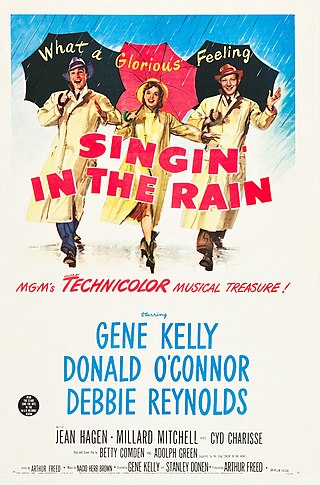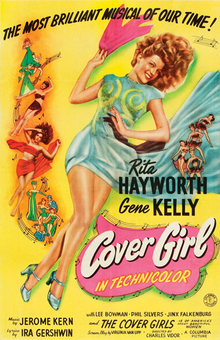
Broadway Melody of 1936 is a musical film released by Metro-Goldwyn-Mayer in 1935. In New York, the film opened at the Capitol Theatre, the site of many prestigious MGM premieres. It was a follow-up of sorts to the successful The Broadway Melody, which had been released in 1929, although, there is no story connection with the earlier film beyond the title and some music.

George Lloyd Murphy was an American actor and politician. Murphy was a song-and-dance leading man in many big-budget Hollywood musicals from 1930 to 1952. He was the president of the Screen Actors Guild from 1944 to 1946, and was awarded an honorary Oscar in 1951. Murphy served from 1965 to 1971 as U.S. Senator from California, the first notable American actor to be elected to statewide office in California, predating Ronald Reagan and Arnold Schwarzenegger, who each served two terms as governor. He is the only United States Senator represented by a star on the Hollywood Walk of Fame.

Cabin in the Sky is a 1943 American musical film based on the 1940 Broadway musical of the same name. The first feature film directed by Vincente Minnelli, Cabin in the Sky features an all-black cast and stars Ethel Waters, Eddie "Rochester" Anderson and Lena Horne. Waters and Rex Ingram reprise their roles from the Broadway production as Petunia and Lucifer Junior, respectively. The film was Horne's first and only leading role in an MGM musical. Louis Armstrong is also featured in the film as one of Lucifer Junior's minions, and Duke Ellington and his Orchestra have a showcase musical number in the film.

That's Entertainment! is a 1974 American compilation film released by Metro-Goldwyn-Mayer to celebrate the studio's 50th anniversary. The success of the retrospective prompted a 1976 sequel, the related 1985 film That's Dancing!, and a third installment in 1994.

Broadway Melody of 1940 is a 1940 MGM film musical starring Fred Astaire, Eleanor Powell and George Murphy. It was directed by Norman Taurog and features music by Cole Porter, including "Begin the Beguine".

Broadway Melody of 1938 is a 1937 American musical film produced by Metro-Goldwyn-Mayer and directed by Roy Del Ruth. The film is essentially a backstage musical revue, featuring high-budget sets and cinematography in the MGM musical tradition. The film stars Eleanor Powell and Robert Taylor and features Buddy Ebsen, George Murphy, Judy Garland, Sophie Tucker, Raymond Walburn, Robert Benchley and Binnie Barnes.

Singin' in the Rain is a 1952 American musical romantic comedy film directed and choreographed by Gene Kelly and Stanley Donen, starring Kelly, Donald O'Connor and Debbie Reynolds, and featuring Jean Hagen, Millard Mitchell, Rita Moreno and Cyd Charisse in supporting roles. It offers a lighthearted depiction of Hollywood in the late 1920s, with the three stars portraying performers caught up in the transition from silent films to "talkies".
"I Got Rhythm" is a piece composed by George Gershwin with lyrics by Ira Gershwin and published in 1930, which became a jazz standard. Its chord progression, known as the "rhythm changes", is the foundation for many other popular jazz tunes such as Charlie Parker's and Dizzy Gillespie's bebop standard "Anthropology ".

Cover Girl is a 1944 American musical romantic comedy film directed by Charles Vidor, and starring Rita Hayworth and Gene Kelly. The film tells the story of a chorus girl given a chance at stardom when she is offered an opportunity to be a highly paid cover girl. It was one of the most popular musicals of the war years.

Ziegfeld Follies is a 1945 American musical comedy film released by Metro-Goldwyn-Mayer (MGM), primarily directed by Vincente Minnelli, with segments directed by Lemuel Ayers, Roy Del Ruth, Robert Lewis, and George Sidney, the film's original director before Minnelli took over. Other directors that are claimed to have made uncredited contributions to the film are Merrill Pye, Norman Taurog, and Charles Walters. It stars many MGM leading talents, including Fred Astaire, Lucille Ball, Lucille Bremer, Fanny Brice, Judy Garland, Kathryn Grayson, Lena Horne, Gene Kelly, James Melton, Victor Moore, William Powell, Red Skelton, and Esther Williams.

That's Entertainment, Part II is a 1976 American compilation film released by Metro-Goldwyn-Mayer and a sequel to That's Entertainment! (1974). Like the previous film, That's Entertainment, Part II was a retrospective of famous films released by MGM from the 1930s to the 1950s. Some posters for the film use Part 2 rather than Part II in the title.

Till the Clouds Roll By is a 1946 American Technicolor musical film produced by Metro-Goldwyn-Mayer and a fictionalized biopic of composer Jerome Kern, portrayed by Robert Walker. Kern was involved with the production, but died before its completion. It was the first in a series of MGM biopics about Broadway composers.

Thousands Cheer is a 1943 American musical comedy film directed by George Sidney and released by Metro-Goldwyn-Mayer. Produced during the Second World War, the film was intended as a morale booster for American troops and their families.

I Dood It is a 1943 American musical comedy film starring Red Skelton and Eleanor Powell, directed by Vincente Minnelli, and released by Metro-Goldwyn-Mayer. The screenplay is by Fred Saidy and Sig Herzig and the film features Richard Ainley, Patricia Dane, Lena Horne, and Hazel Scott. John Hodiak plays a villain in this production, just his third movie role. Jimmy Dorsey and his Orchestra provide musical interludes.

For Me and My Gal is a 1942 American musical film directed by Busby Berkeley, and starring Judy Garland, George Murphy, Martha Eggerth, Ben Blue and Gene Kelly in his film debut. The film was written by Richard Sherman, Fred F. Finklehoffe and Sid Silvers, based on a story by Howard Emmett Rogers inspired by a true story about vaudeville actors Harry Palmer and Jo Hayden, when Palmer was drafted into World War I. The film was a production of the Arthur Freed unit at MGM.

Lady Be Good is an American musical film directed by Norman Z. McLeod and starring Eleanor Powell, Ann Sothern, Robert Young, Lionel Barrymore, and Red Skelton. It was made by Metro-Goldwyn-Mayer and produced by Arthur Freed. This was the first of several films Powell made with Skelton. Powell received top billing, but Sothern and Young are the main stars. They play, respectively, Dixie Donegan, a would-be lyricist, and Eddie Crane, a struggling composer.

"Somebody Loves Me" is a popular song, with music written by George Gershwin, and lyrics by Ballard MacDonald and Buddy DeSylva. The song was published in 1924 and featured in George White's Scandals of 1924.

Girl Crazy is a 1943 American musical film starring Judy Garland and Mickey Rooney. Produced by the Freed Unit of Metro-Goldwyn-Mayer, it is based on the stage musical Girl Crazy – which was written by Guy Bolton and Jack McGowan, with music and lyrics by George and Ira Gershwin. It was the last of Garland and Rooney's nine movies as co-stars, the pair appearing only once more together on film, as guest stars in 1948's Words and Music.

Two Girls and a Sailor is a 1944 American musical film directed by Richard Thorpe and starring Van Johnson, June Allyson and Gloria DeHaven. Set on the American homefront during World War II, it's about two singing sisters who create a lavish canteen to entertain members of the military, thanks to financial contributions from a mysterious donor. The picture features a host of celebrity performances, including Jimmy Durante doing his hallmark "Inka Dinka Doo", Gracie Allen, and Lena Horne. Richard Connell and Gladys Lehman were nominated for the Academy Award for Best Original Screenplay.

Du Barry Was a Lady is a 1943 American musical comedy film directed by Roy Del Ruth, starring Red Skelton, Lucille Ball, Gene Kelly, and Tommy Dorsey and His Orchestra. It is based on the 1939 stage musical of the same name. Shot in Technicolor, the film was produced and distributed by Metro-Goldwyn-Mayer.



















